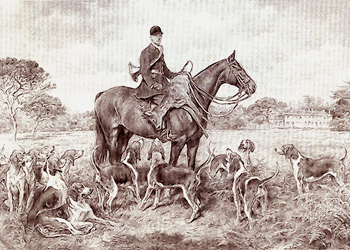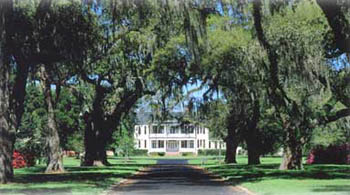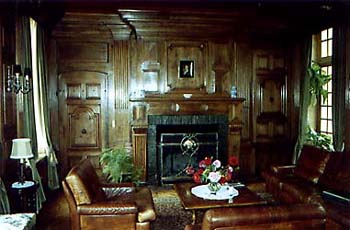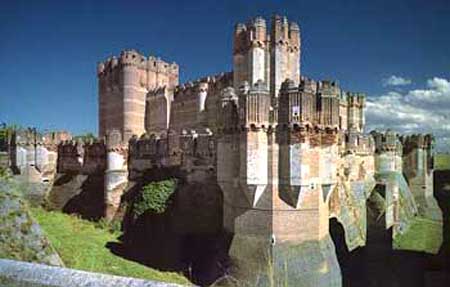 |
Organic Society
Organic Society and the Desire for Heaven
Plinio Corrêa de Oliveira
Since this earth is a land of exile, it was made to not satisfy us entirely. If it could do so, it would not be an exile, but a kind of second fatherland, more like the magnificent fatherland God prepared for us in heavenly Paradise.
As a land of exile, it should be not only defective in this or that detail, but in its fundamental note, which is that we do not feel ourselves at home here. This is the principle characteristic of our earthly exile, and a powerful invitation to think about Heaven and the means to attain it.
Nonetheless, keeping this fundamental truth in view, when we follow Natural Law and Catholic principles, we can create in some ambiences something of that feeling that we are at home.
One of these places is in our family ambiences. When the family is Catholic, what attracts one is not so much a beautiful living room or a pleasant patio, but rather an ensemble of imponderables that satisfies some part of one's appetite for eternity. If this exists, then the person feels at home.

In Normandy a man returns from the hunt

Oaks line the walk of a Southern plantation, offering shade and ambience

The den in a chateau provides a serious, calm atmosphere |
I remember paging through a photo-album showing how some old families live in France today, and how they feel chez soi [at home]. One of the pictures shows a father and a servant heading out to hunt on horseback in the morning fog. The servant carries a horn, and several dogs accompany them. The ambience of the scene would clearly appeal to the family members.
Another picture shows a different home, the atmosphere marked by a long row of oak trees planted in two parallel lines lining the roadway to the entrance of the country mansion. The branches of the two lines of oaks met and touched over the lane, offering a fresh, shady atmosphere that protects the person beneath them.
The ambience of another family home was represented by a fireplace with several leather chairs around it suggesting the many conversations of the family seated around the fire listening to the wise counsels of the father or the stories of the grandfather.
When a family tries to translate its own personality in material things in its home, it instinctively creates an ambience that provides for the needs of its members. This does not mean that the decoration of the house must be rich, and the family wealthy. Concern for money is not what is at issue here. We are talking about creating an ambience that realizes the family's personality and makes its members feel at home.
This ambience is not primarily an ensemble of furniture or style of decor, but rather an ensemble of persons. The gift of the family, when it is according to Our Lady, is to offer to one another reciprocal affection. When this exists, the members feel a satisfaction that nothing can equal. This transcends the house, decoration, and furniture; it is prior to everything else. This is why the family has the same taste for the same recipes, the same plays, the same music; why it shares the same attitude in face of suffering, has the same longings, etc. It is what makes the relationships of men on earth more similar to those of the blessed in Paradise.
An analogous ambience can also be engendered in other human groups, although it is more diluted than that in the family. For example, in a club of gentlemen that follows Catholic principles, the members share the same tastes, traditions, and social relations; their families know one another, the members have admiration for the same ideals, and treat each other with the same good manners. Such a club serves for its members as a large family, giving more air and horizon to the life of family. To be a member of it is a way of being in a family without being in one's particular family. It allows the person to breathe a different air and opens the eyes to broader horizons.
So, in an organic society constituted according to Our Lady, these ambiences can attenuate the feeling of exile we have on earth, away from Heaven.
This fulfillment of the longing of Heaven has its limits. It constitutes something that at the same time is real and unreal. It is a reality because one can generate these ambiences, and many people in the past truly did create them.
But it is also an unreality, because it never exists in a perfect way, as perfect as one would like. I am not speaking about the frictions and problems that always exist in a family; I am speaking of a certain confined air caused by the close relationship that exists in the family. The close relationship is so pleasant - but it is so restrictive that at times one can find it unpleasant. Man has the need for more air, for broader horizons to satisfy his psychological needs.
Equilibrium between the confined air of the family and the open air of society is needed for the healthy formation of its members.
At depth, everyone has needs of soul that crave fulfillment. These longings end in a kind of unreal and ideal world which the person is always walking toward.

The medieval castle invites us to heroism and the sublime, Coca, Spain |
What is this ideal? I am calling ideal Heaven, the place where all the legitimate appetites of a man's soul are fulfilled in an ever increasing way and for all eternity. The notion of this ideal is always present in a man's life in some way or another. Often he does not want to admit that this ideal is the vision of God he was called to have, and he seeks out false solutions for his psychological needs and goes astray. But this ideal is the profound reason for his life.
You see that I am speaking about things different than getting a job or making money or making a career, or things of that sort. It is a much higher and more essential order of considerations.
So, life on this earth should be viewed as an unsatisfied longing for an ideal world. Such a world is both feasible and unfeasible. Insofar as we make a rough draft of that ideal world in this life, we will find its final copy in Heaven after we die. This appetite can be realized to some degree on this earth, and it will be fully realized in Heaven. In this life we can have only a pre-figure of what will be in Heaven.
Was there in History an epoch where this ambience was realized? I believe that it was realized in the Middle Ages by means of a continuous progress toward perfection. Each century of the Middle Ages developed the aspiration of the century before it. We can see continuity and progress in this same longing for Heaven, and the attempt to make earth as similar to it as possible. For instance, this progress is noticed in the advancement from the Romanic style to the Gothic, and then in the different phases of the Gothic. It follows the same tendency to the sublime that constantly ascends.
This tendency toward perfection marks the progress that takes place naturally in Catholic organic society.

Posted February 14, 2007

  | | Prof. Plinio |
Organic Society was a theme dear to the late Prof. Plinio Corrêa de Oliveira. He addressed this topic on countless occasions during his life - at times in lectures for the formation of his disciples, at times in meetings with friends who gathered to study the social aspects and history of Christendom, at times just in passing.
Atila S. Guimarães selected excerpts of these lectures and conversations from the trancripts of tapes and his own personal notes. He translated and adapted them into articles for the TIA website. In these texts fidelity to the original ideas and words is kept as much as possible.

Related Topics of Interest
 What is Organic Society? What is Organic Society?
 The Moon and its Halo The Moon and its Halo
 Paradise: A Heavenly Court Paradise: A Heavenly Court
 Departure for the Crusade: A Desire for Sublimity Departure for the Crusade: A Desire for Sublimity
 The Celestial Happiness of Our Lady in Heaven The Celestial Happiness of Our Lady in Heaven
 The Appeal of the Stones of San Juan Capistrano The Appeal of the Stones of San Juan Capistrano

|
Organic Society | Social-Political | Home | Books | CDs | Search | Contact Us

© 2002- Tradition in Action, Inc. All Rights Reserved
|
 |
|